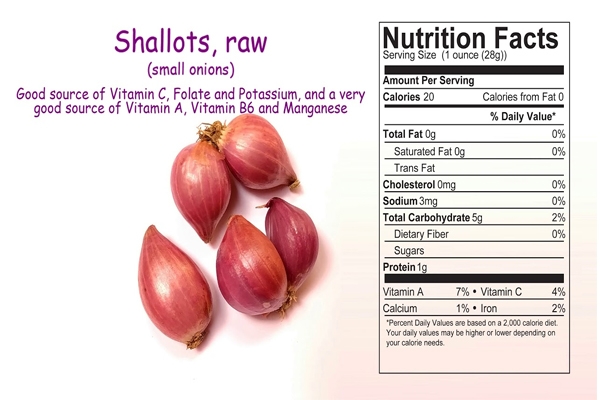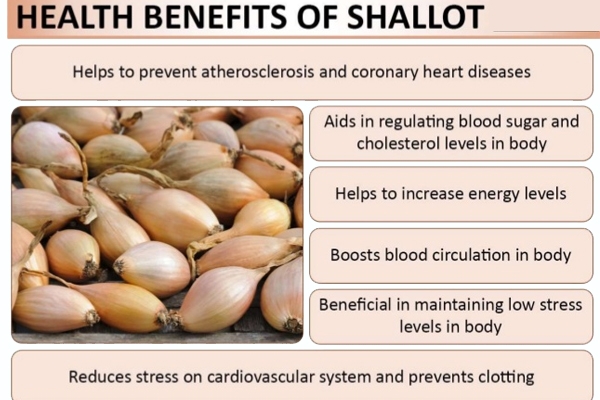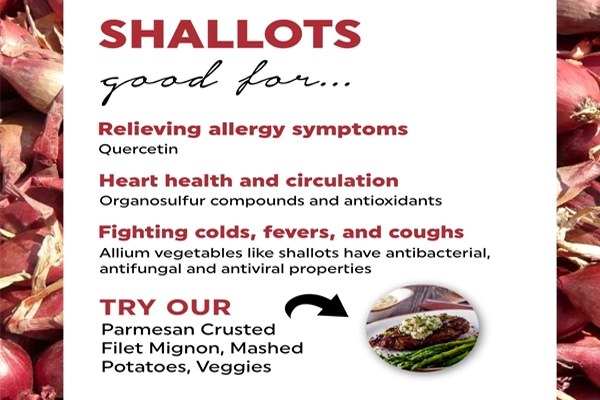Blog
What Are Shallots? Nutrition and Benefits
Shallot contain many nutrients such as vitamin C, vitamin B6, biotin, folic acid, chromium, calcium and healthy fiber. Let's find the use of shallot with LKS 360 Exim - The address has developed technology and expanded the range of crops.Besides, we also specialize in providing and exporting farm products, orbital and medical products (medical gloves, medical masks, surgical products, orbital pharmaceutical,...).
The wonderful nutrients found in shallot
Shallot have quercetin
The presence of quercetin in shallot has anti-fungal, anti-inflammatory and antioxidant effects. This food has been proven very effective in fighting common colds and fevers, especially in preventing cancer.
Shallot contain allicin
In addition to quercetin, shallot contain allicin, which is good for heart health, fights cancer-causing viruses and prevents their growth in the body. Regularly eating shallot reduces and controls blood pressure stably. Moreover, the anti-fungal properties of shallot help prevent and ward off diseases very effectively.
Rich in organosulfur
Studies have revealed that shallots are a rich source of organosulfur that is effective against prostate and stomach cancer pathogens. Organosulfur creates a protective layer against prostate and stomach cancer.
Compound onionin A
Shallot also contain the compound onionin A which is said to be very effective in reducing inflammation and pain. It suppresses immune cells to relieve pain. People with asthma, allergies and arthritis should regularly eat shallot.
The other great use of shallot
Improve heart health: Eating shallot helps lower cholesterol and triglycerides. The sulfur compounds in shallot have anti-clotting effects. Quercetin prevents hardening of the arteries by eliminating plaque formation and reducing the risk of heart attacks.
Treat breathing problems: The anti-inflammatory activity of shallots helps to relax the respiratory muscles and relieves asthma and bronchitis. It is also effective in preventing coughs, colds, flu, sneezing and runny nose.
Prevent foodborne illness: The antibacterial effect of shallots helps to treat foodborne illnesses caused by bacterial infections. The phytochemicals present in shallots reduce the risk of stomach ulcers.
The rich source of fiber in shallots effectively cures constipation and promotes the growth of beneficial bacteria in the intestines. Eating an onion a day will avoid constipation. Control blood pressure. shallot are low in calories, low in sodium, and fat-free. Eating shallot helps increase the elasticity of blood vessels and is effective in lowering blood pressure.
Effective body cleansing : Using daily food, oral medications... can accumulate many toxins in the body, so it is advisable to purify the body. Here are effective ways to purify the body, according to naturalnews.
Improve TB symptoms : shallot are antiseptic as well as possessing antibacterial properties. It can inactivate the bacteria that cause tuberculosis. Eating shallot with salt is more effective.
Increase breast milk secretion : Eating fresh shallot has the effect of increasing milk production in nursing mothers. Need to consult with your doctor, to know how to eat appropriately.
"Drugs" against cancer : The phytochemicals disulphide, trisulphide, cepaene and quercetin in shallots have the effect of reducing inflammation and preventing cancer. Purple shallot also help improve digestive problems including loss of appetite, indigestion, stomach and gallbladder disorders.
The high iron content in shallots helps in the treatment of anemia. Eating 1 shallot a day helps to supplement the amount of iron in the body. Purple shallot also help significantly improve blood sugar levels, while limiting sugar intake in the body.
Blog









